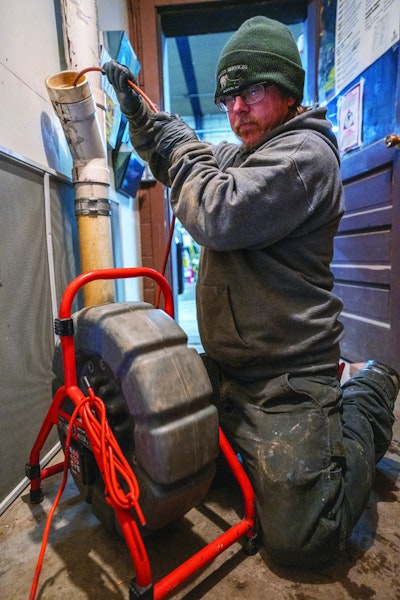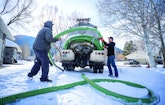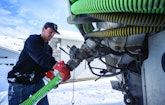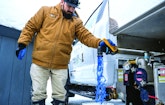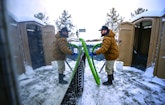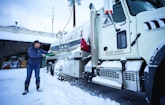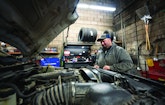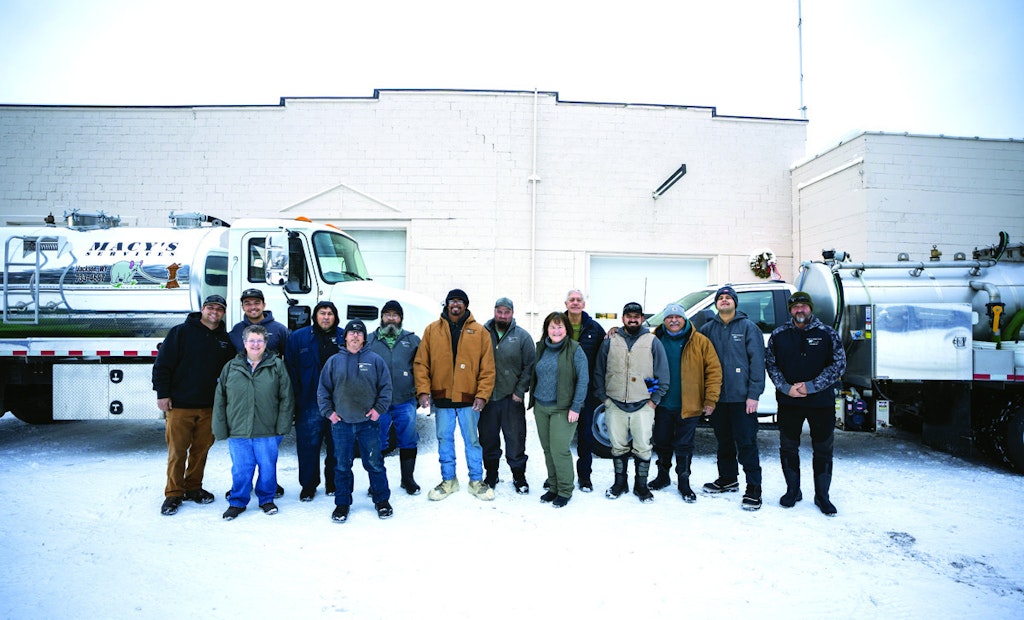
The Macy’s Services team includes, from left, David Reppa, Justin Reppa, Kelly Ryan, David Jimenez, Justin Forsberg, Bill Clark, Frank Thomas, Tyler Griffin, Bobbie Reppa, Dwight Reppa, Mario Juarez, Alberto Juarez, Claudio Arenas Luna and Randy Hoffman. (Photos by Kathryn Ziesig)
Interested in Portable Sanitation?
Get Portable Sanitation articles, news and videos right in your inbox! Sign up now.
Portable Sanitation + Get AlertsWhen opportunity knocks at Macy’s Services in Jackson, Wyoming, someone is always eager to answer the door. And by doing so, owners Dwight and Bobbie Reppa have slowly transformed the business from providing primarily septic services into a fully diversified business.
The biggest business segment now is portable restroom rentals and service. The company also cleans and inspects sewers, pumps out grease traps and delivers potable water, says Justin Reppa, Bobbie and Dwight’s son.
What’s the company’s secret sauce for repeated business expansions?
“We give customers what they ask for,” says Justin, 25, the company’s safety and fleet manager. He also manages the portable restroom arm of the business. His brother, David, handles the septic side, while Dwight oversees company operations and Bobbie manages the office.
Over the years, the company has built a reputation for problem-solving.
“When someone has a weird project, people will tell them to call Macy’s,” Justin says. “They’ll call my dad and say, ‘Dwight, can you do this?’ And even if we never did it before, we figure out how to help.”
As an example, he says his father recently created a constructed, cascading stream that flows between several ponds on a large property outside of Jackson. It required a lift station and multiple pumps that his father had never installed before. But he figured out how to do it.
That let’s-give-it-a-try mentality was instilled in the company’s DNA by founders Jim and Lee Macy (Bobbie’s parents), who established the company in 1983, he says.
For example, back in the 1980s, Jim Macy bought a used municipal water jetter to clean sewers after someone approached him and requested that service. He also invested in portable restrooms when a customer asked if he could provide them, Justin says.
“That mentality carried over to my father,” he says. “And I try to operate the same way myself. If we can do something that someone asks for, we make it happen.”
The company also started pumping out grease traps in 2000, once again in response to customers’ requests.
RESTROOMS DRIVE GROWTH
Macy’s has grown significantly since the company was first profiled in Pumper in 2011. A lot of that growth stemmed from a major shift into portable restroom rentals, which in turn was driven by a sharp increase in construction activity during the last five or so years, according to Justin.
Today, portable sanitation generates about 50% of the company revenue, septic tank pumping kicks in about 15%, sewer cleaning contributes around 15% and the rest comes from pumping grease traps, septic system repairs and inspections, and potable water delivery.
By comparison, portable sanitation contributed only about 25% of the company’s revenue in 2011 when the business ran just two restroom routes five days a week with two full-time technicians and one part-timer, he notes.
“Now we have five full-time restroom technicians and one part-time technician,” Justin explains. “And we run five routes three days a week, cleaning anywhere from 170 to 200 restrooms along the way, and then run three routes two days a week, cleaning about 100 restrooms a day.
“Some of our guys make more than 30 stops a day,” Reppa adds. “They cover a lot of hours — we have a very dedicated crew.”
The construction growth stems from a hot commercial and residential market, with people tearing down older houses to make way for larger modern homes. Keeping up with demand has been difficult, Justin says, noting the company added more than 200 restrooms in the last three years.
“We could’ve grown even more, but we can only grow so quickly because the labor market is really tough in our county,” he says. “It’s not uncommon to see 12 to 13 pages of want ads in the local paper.
“Most of our hires come through by word-of-mouth referrals,” Justin continues. “It’s a huge plus when you have employees that actively advocate for us because they enjoy working here so much.”
INVEST IN EQUIPMENT
To service restrooms, Macy’s relies on a 2017 Ram 5500 with a 400-gallon waste/200-gallon freshwater stainless steel tank from Best Enterprises; a 2017 Ram 5500 with a 700-gallon waste/500-gallon freshwater aluminum tank from Progress Tank; a 2017 Ram 5500 with a 500-gallon waste/300-gallon freshwater steel, self-fabricated tank; a 2020 Ram 5500 with a 700-gallon waste/300-gallon stainless steel tank from KeeVac Industries; 2014, 2017 and 2020 Ram 5500s, each equipped with a 700-gallon waste/400-gallon freshwater stainless steel tank from Best; and a 2022 Ford F-600 with a 700-gallon waste/400-gallon freshwater stainless steel tank from KeeVac. All the trucks feature Masport pumps.
Macy’s also owns about 750 portable restrooms from Satellite Industries and PolyJohn; about 20 hand-wash stations from PolyJohn; and five restroom trailers for special events – four from JAG Mobile Solutions and one from Forest River Mobile Restrooms.
On the septic side of the business, the company owns a 2004 Peterbilt 330 with a 2,300-gallon aluminum tank, recently rebuilt by FRB Welding with a Masport blower; a 2019 Mack Granite with a 3,300-gallon aluminum tank from FRB and a Masport pump; and a 2023 Mack MD7 with a 2,500-gallon aluminum tank from KeeVac and a Masport pump.
The company also built out several trucks in-house, including a 2002 Freightliner FL70 with an 1,800-gallon steel tank and a Masport pump. Macy’s also owns a Terralift drainfield rejuvenation machine, made by Terralift International Family of Companies.
Powerful 1,000 cfm Masport MB1000 blowers recently installed on two trucks — the 2019 Mack and the 2004 Peterbilt — have dramatically boosted productivity, Justin says. “It now takes technicians 15 to 20 minutes to pump septic tanks instead of 40 to 50 minutes,” he says. “They also make it easier on their bodies.”
GREASE AND SEWER WORK
Grease service has also grown substantially during the last five years, driven largely by a county regulation that mandates grease-trap installations for businesses, primarily restaurants.
To clean grease traps, the company relies on three vacuum trucks: a 2001 Freightliner FL70 built in-house with a repurposed 2,000-gallon steel tank and a Masport pump; a 2006 Freightliner M2 with a 2,500-gallon aluminum tank from Progress, built out by TOICO Industries with a Masport pump; and a 2007 Ford F-550 with a 1,000-gallon steel tank from FRB and a vacuum pump from Masport.
To handle grease disposal, the company invested in a Sludge Mate dewatering trailer from Flo Trend Systems, equipped with a 1,000-gallon tank. It can process up to 4,000 gallons daily. “We use it to dewater grease so we can dispose of it in a local landfill,” Justin says. “Otherwise we have to haul it to a private processing facility that’s about 120 miles away.”
The company also installs smaller grease traps now, up to 350 gallons, he says.
To clean sewers, the company invested in a 2004 Freightliner waterjetting truck, outfitted by Sewer Equipment. The truck features two water pumps of unknown make (4,000 psi at 18 gpm and 4,000 psi at 25 gpm); two hose reels that each hold 500 feet of hose; and a 700-gallon water tank. The business also relies on four RIDGID SeeSnake pipeline-inspection camera systems and three drain-cleaning machines from General Pipe Cleaners.
To haul potable water, the company owns a 2002 Ford F-550 with a 700-gallon plastic tank and a 2017 Ram 5500 with a 400-gallon plastic tank; both tanks were made by Norwesco. The company also hauls water with a 1991 Peterbilt with a repurposed 4,000-gallon aluminum milk truck tank.
FORK IN THE ROAD
As Justin looks back on what his grandparents and parents have built, and what he and his brother continue to grow, he’s not only proud of the company’s success, but also of all the business relationships cultivated over the years.
“When we walk around our community, everyone always has great things to say about our company,” he says. “That’s a really cool thing to hear.
“And everyone loves my dad,” he adds. “If we go out for breakfast or dinner, he always ends up talking to someone for 15 or 20 minutes. They just love him and they love doing business with him — he’s built great customer relationships.”
As for the future, further growth is somewhat constrained by a tight labor market and the expense of new equipment. And a succession plan is in a state of flux as he and his brother, age 36, weigh their options.
“I still want to have a life outside of the business and I’m not sure that’s possible after my parents retire, especially since my dad has a lot of certifications that David and I don’t have and that we’d need in order to keep providing the services we offer,” he continues.
“We love the business and would love to see it continue,” Justin concludes. “But we also want to maintain a good work-life balance. We’ll have to see what happens.”
